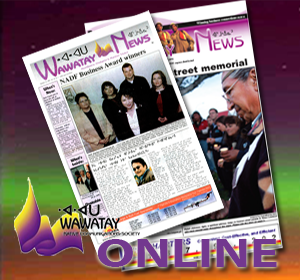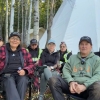Wabauskang Chief Leslie Cameron recently recalled the pain he felt when he discovered a clearcut through part of his family’s trapline.
“When I went to our cabin, they had a road pushed right in behind — it looked like a desert,” Cameron said, noting the Ministry of Natural Resources had cleaned up a 2004 blowdown on the trapline. “We camped there in the camper trailer and we came out in the moonlight. It was like you were on the moon — nothing but clay. It’s horrible. It made me cry. I was telling my wife I’m glad my dad is not here to see this.”
Cameron said the Ministry of Northern Development and Mines has also issued a mining permit to an independent prospector on the trapline.
“They keep pushing permits right on my trapline,” Cameron said. “We opposed them and we use our traditional teachings, but they come back and say they won’t use (the land) in hunting season. But they forget that Native people can hunt anytime, we don’t have a schedule and we can go (hunting) anytime we want.”
Cameron said the community has been teaching youth how to hunt and fish on the trapline, which has been in his family for five generations.
“The longer I’ve been in as chief, the more angry I get towards industry and government because it’s like our treaties don’t mean a thing,” Cameron said.
Wabauskang and Grassy Narrows were recently granted leave to appeal by the Supreme Court of Canada over the Court of Appeal of Ontario March 18 Keewatin decision on whether or not Ontario has the authority to make land-use decisions in Treaty 3 without federal involvement.
“We are very happy that the Supreme Court is going to hear our appeal,” Cameron said. “We expect that the Supreme Court will agree with us that Ontario doesn’t have the right to issue authorizations to mining and other resource companies in our territory. Canada needs to be involved to make sure our treaty rights are respected.”
The two Treaty 3 communities were granted leave to appeal on Sept. 19 after filing leaves to appeal this past May.
“My hats off to Grassy, the trappers there, for saying enough is enough,” Cameron said.
The appeal will likely be heard in late 2014 and the decision is not expected until 2015.
The Ontario Superior Court of Justice had earlier found in 2011 that (i) Ontario does not have not have authority, within lands subject to Treaty 3 and added to Ontario in 1912, to exercise the right to take up tracts of land for forestry so as to limit the area over which the applicants may exercise their treaty rights to hunt or fish without first obtain approval of the federal government, and (ii) Ontario does not have the constitutional authority to justifiably infringe the rights of the applicants exercise their treaty rights to hunt or fish so as to validly authorize forestry operations on Treaty 3 lands.
Wabauskang also filed a lawsuit against Rubicon Minerals in December 2012 to either suspend or cancel Ontario’s decision to approve a closure plan for Rubicon’s Phoenix Gold Project on the basis that Ontario had no authorization to approve the closure plan without Canada’s involvement.
“We fully expect to be successful at the Supreme Court, and we expect that we will be successful in our lawsuit against Rubicon as well,” Cameron said. “We’ve always said that Ontario had no jurisdiction to approve Rubicon’s closure plan.”
I am the product, evolution of many thousands of years as are you.












I am the product, evolution of many thousands of years as are you. I grew up on the land in the remote far north of Ontario following in the footsteps of my...
One of the most beautiful serene places I’ve ever visited was on the banks of the Opinagau River in northern Ontario, just near the corner of land where...